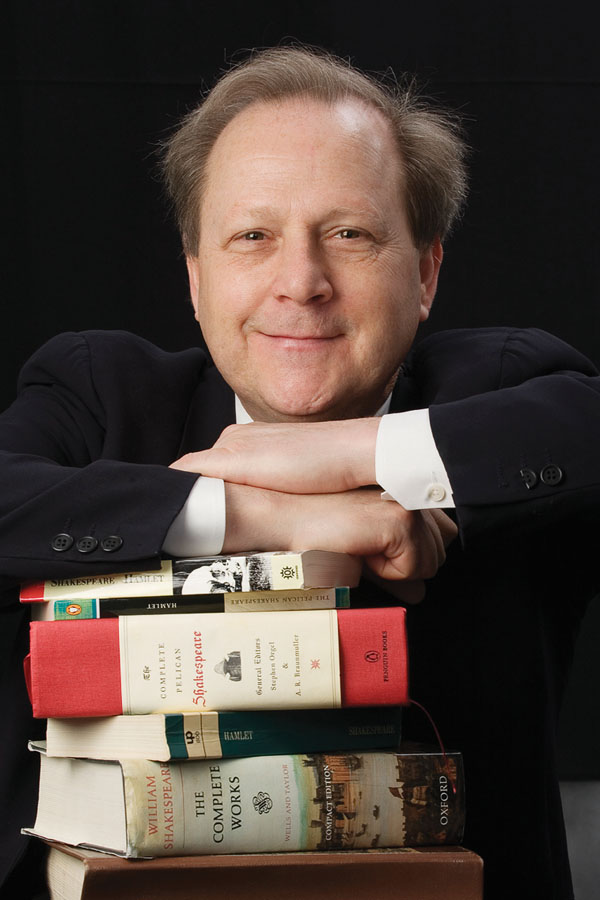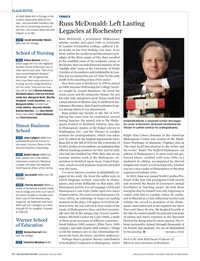Class Notes
 SHAKESPEAREAN: A renowned scholar who began his career at Rochester, McDonald established the Theater in London seminar for
undergraduates.Tribute (Photo: Chris English/University of North Carolina at Greensboro)
SHAKESPEAREAN: A renowned scholar who began his career at Rochester, McDonald established the Theater in London seminar for
undergraduates.Tribute (Photo: Chris English/University of North Carolina at Greensboro)Russ McDonald, a preeminent Shakespeare scholar, teacher, and opera critic at University of London Goldsmiths College, suffered a fatal stroke on his 67th birthday last June. If we think within the medieval and Renaissance paradigm of the three stages of life, Russ excelled in the youthful years of his academic career at Rochester, then exceeded beyond measure in his “middle elde” years at the University of North Carolina at Greensboro and Goldsmiths in London, but was denied the joys of “elde” by his early death in the dazzling prime of his career.
Russ first came to Rochester in 1978 to attend an NEH Summer Fellowship for College Teachers taught by Joseph Summers. He loved the music scene and the temperate climate (he and his wife, Gail, had grown up in Texas); both had a deep interest in theater; and, in addition to Renaissance literature, Russ found soulmates in opera among others in our department.
Russ joined our faculty in the fall of 1979. During his years here he established several lasting legacies: the annual trip to the Shakespeare Festival in Stratford, Ontario; close ties to Shakespeare studies at the Folger Library in Washington, D.C.; and the Theater in London seminar for undergraduates, which was taken over by others in the English department when Russ left in the fall of 1992 for the University of North Carolina at Greensboro, an institution that offered teaching positions for him and for Gail, who had just finished her PhD. Russ also set up summer seminar work at the Shakespeare Association in Stratford-upon-Avon, United Kingdom, which several graduate students attended over the years.
I’ve never known a teacher as delightfully engaged in his work. He loved the subtle ways in which language worked, especially in Shakespeare, and wrote brilliantly on that topic. His Shakespeare and the Arts of Language (2001) and Shakespeare’s Late Style (2006) open new doors of appreciation. His most recent Shakespeare Up Close (2012), an anthology of essays on reading moments in the plays, will appear in its third edition in 2016. He was a shrewd close reader of the music of Shakespeare’s lines, and their perpetually new life in the unique play of every performance. His book Look to the Lady (2006), a study of three great actresses of different centuries—Sarah Siddons (18th century), Ellen Terry (19th century), and Judy Dench (20th century)—brings to life the intimate day-to-day relationships between the bard, the actors, and their audiences.
Perhaps Russ’s greatest literary contribution is his Bedford Companion to Shakespeare, which Ralph Alan Cohen (founder of the American Shakespeare Center and creator of the Blackfriars Playhouse in Staunton, Virginia) cites as “the most lucid introduction to the writer and his works.” Russ’s The Bedford Shakespeare (an edition of Shakespeare’s 25 most read and performed plays), coedited with Lena Orlin, is a landmark in editing, accompanied by shrewd insights into what’s worth looking into, whether you are a new reader of Shakespeare or the most experienced scholar critic.
In 2003, Russ was named North Carolina Professor of the Year (the prestigious CASE award) and received the Board of Governor’s annual Excellence in Teaching award. He took those strengths that he himself was only beginning to realize with him to London, where he continued to flourish as a truly influential teacher and scholar. He served as president of the Shakespeare Association and wrote regularly for Opera News and Opera Review. He laughed heartily at the idea he would actually be paid and sent pairs of tickets and travel expenses to the Bayreuth Festival for doing what he most enjoyed. His vibrant personality pulsed through thousands of his friends and students. We are all diminished by his passing. —Russell Peck
Peck is the John Hall Deane Professor of Rhetoric and Literature at Rochester.

